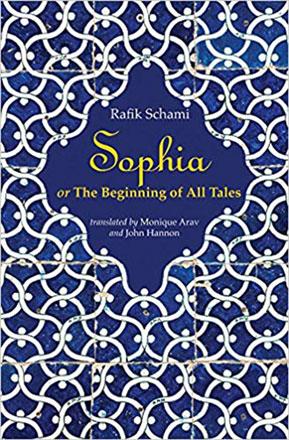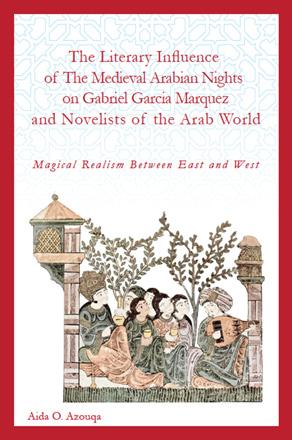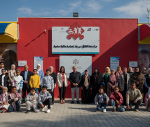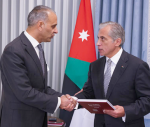You are here
Precarious homecoming
Aug 05,2018 - Last updated at Aug 06,2018

Sophia, or the Beginning of All Tales
Rafik Schami
Translated from German by Monique Arav and John Hannon
US: Interlink Books, 2018
Pp. 444
Homesickness catalyses the plot in Rafik Schami’s latest novel, “Sophie”. Though living mostly happily in Italy for many years, and having a wife, son and successful business there, Salman Baladi longs for his native Damascus. “It wasn’t until much later that he would learn that the Damascus he dreamt of in his loneliness existed only in his imagination.” (p. 122)
Although the focus is on Damascus, the novel also moves to Homs, Lebanon, Germany and Italy. The narrative spans the timeframe from the 1920s to 2010, alluding to many historical events of the last century and ending as the Arab uprisings begin to break out, accentuating the novel’s themes of honour, dignity, freedom and betrayal.
Returning home after forty years is complicated for Salman because he had left Syria illegally after the defeat of the underground opposition group of which he was a member. But when a general amnesty is declared in 2010, he is determined to go and visit his parents. They have a relative high-up in the secret service from whom they get assurances that Salman will not be harassed or arrested. Reassured, he travels to Damascus, but promises are not always kept, and he learns that money and fear count more than honour, kinship or friendship. Though many have good intentions, they nonetheless risk getting caught up in or victimised by webs of deceit and corruption. The latter part of the book is something of a thriller: Salman does not know whom he can trust, or if he will be able to return to his wife, Stella, and son Paolo in Rome.
Like Salman, Schami is a Syrian in exile; through Salman’s eyes, he highlights what is best in Syrian society — and by implication Arab society — as well as what is worst. Parts of the book are like an ode to Damascus, with charming descriptions of people, places and everyday life, particularly in the Old City. But it is also an indictment of what can make life in Syria difficult and sometimes ugly, whether state repression, with its extensive prison and torture network, or the public’s forced complicity. Schami is adept at integrating political and social critique into the narrative without disrupting its literary flow. Sometimes the characters speak for him; at other times, he uses subtle irony to reveal abuses of power, hypocrisy and the perils of the clan system.
Karim, a friend of Salman’s mother, Sofie, in their youth, is almost destroyed by the clan system; he is expected to kill his sister to restore his family’s “honour” after she marries a Christian. “The whole thing was based on members blindly following their chief — in this case his father — oblivious to the fact that he was leading them to ruin with a pack of lies”. (p. 159)
In the same vein, Salman gets a lecture from his Aunt Amalia, who has lived in Beirut since being disowned by her family: “No change will ever come to Arab countries until the very structure of the clan that enslaves us, body and soul, has been destroyed.” (p. 44)
Schami spins his story around a set of opposites: exile vs belonging, love vs hate, peacefulness vs. violence and tolerance vs. prejudice. It is not a tight-knit plot; on the contrary, there are stories within stories and many digressions. Schami is known as a storyteller in the Arabic tradition and for having integrated that style into European literature. His “digressions” deepen the themes of the novel, particularly love, which is portrayed in all its types and degrees.
Such is the story of Aida and Karim, who fall in love as seniors, she from a Christian family and he from a Muslim one. The distinctive thing about their love is not just that it crosses sectarian boundaries but that it inspires them to pursue thwarted childhood dreams. Karim is teaching Aida to ride a bicycle — something she was forbidden to do as a child, while Aida is teaching Karim to play the oud, which along with all music was banned by his father. Aida and Karim become central to the plot because they help Salman when no one else can or will.
Salman’s and Stella’s marriage shows that different backgrounds can enrich a relationship, while Aida’s and Karim’s love shows that open-mindedness does not have to come from abroad but can happen wherever people are ready for harmony that thrives on difference not sameness. “Only a vivid combination of different — even opposing — colours and tones, only a lively coming together of people of different temperaments and opinions, could give rise to a living harmony. It was a balance of opposites that could only occur among people through respect and love, but above all through reason. Once achieved, such a balance outlasted by far any coercive control.” (p. 289)
Sally Bland
Related Articles
Mapping My Return: A Palestinian MemoirSalman Abu SittaCairo/New York: The American University in Cairo Press, 2016Pp.
The Literary Influence of the Mediaeval Arabian Nights on Gabriel Garcia Marquez and Novelists of the Arab WorldAida O.
There is an unusual, haunting love story intertwined with a coming-of-age novel, both infused with elements of myth, science fiction, philosophy and multiple cultural references.















